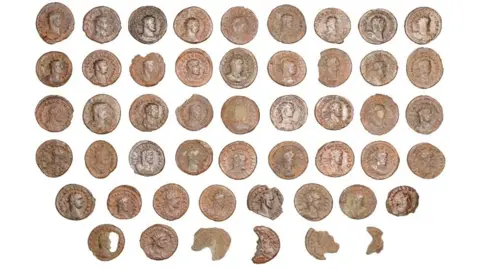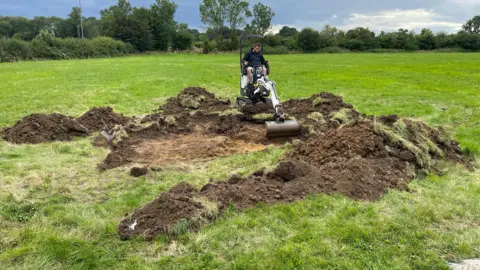Roman coins discovery a 'once-in-a-lifetime find'
 David Dunn
David DunnA haul of 50 Roman coins that were unearthed by a metal detectorist is expected to fetch between £1,200 and £1,500 at auction.
David Dunn, 42, made the discovery on 19 July 2023 when he decided to revisit the field near his home in Sapcote, Leicestershire.
He said "something told" him to go to the field, which he had visited "numerous times" and after his metal detector picked up a faint signal, he found two Roman coins in the same hole.
Mr Dunn, who has been metal detecting for two years, said he went to get the farmer and dug a further two feet (61cm) down where they found 50 coins.
 Noonans
Noonans"Who knows what would have happened if we continued digging further," Mr Dunn added.
"I am not aware of any other finds in the field.
"Many of the coins that I found were in really good condition with perfect portraits – it was a once-in-a-lifetime find."
Mr Dunn took the coins in a briefcase to his local finds officer, who spent a year offering them to various museums, which did not wish to claim them.
 David Dunn
David DunnThe Antoninianus coins will now be sold in one lot at Noonans Mayfair on 18 February in a sale of British and ancient coins.
Mr Dunn added: "The money doesn't interest me - just finding history is what I love.
"The farmer has had a rough few years since Covid so I'd like to give him the majority of the money if it can help in any way."
Noonans coin expert Alice Cullen said: "The Antoninianus was a coin used during the Roman Empire thought to have been valued at two denarii.
"This hoard dates from the reigns of Carausius who usurped power in 286 after the Carausian Revolt, and declared himself emperor in Britain and northern Gaul."
Follow BBC Leicester on Facebook, on X, or on Instagram. Send your story ideas to [email protected] or via WhatsApp on 0808 100 2210.
